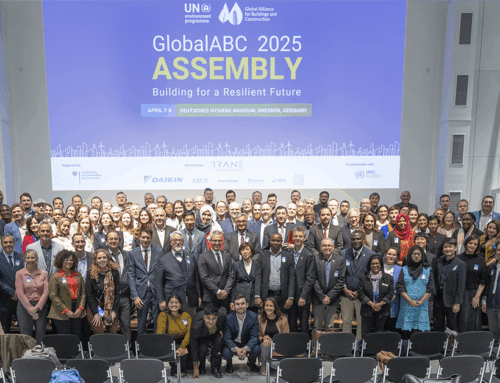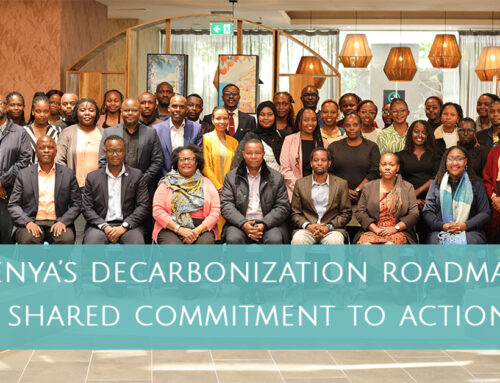Minister of Public Works and Housing 2014-2024, Basuki Hadimuljono (center), GBPN Indonesia Country Manager Sandra Pranoto (second from the right) and the Directorate Generals from the Ministry of Public Works and Housing, Ministry of Energy and Mineral Resources, and Ministry of Home Affairs at the launch of Indonesia’s National Roadmap for Green Building Implementation in Yogyakarta, October 2024
In a landmark effort to transform its cities and lead the charge in sustainability, Indonesia’s Ministry of Public Works and Housing, supported by GBPN, unveiled the National Roadmap for Green Building Implementation. The roadmap was launched during the World Habitat Day at a World Cities Day 2024 event in Yogyakarta. The event highlighted the nation’s growing commitment to sustainable urban development and the decarbonization of its building sector, a crucial step towards achieving long-term environmental goals.
The roadmap, designed to guide the country’s transition to energy-efficient and low-carbon buildings, marks a significant collaboration between multiple key government bodies. Led by the Ministry of Public Works and Housing, together with the Ministry of Energy and Mineral Resources and the Ministry of Home Affairs, to ensure a unified approach in decarbonizing the building sector—a sector responsible for a large share of Indonesia’s greenhouse gas emissions, in Indonesia.
 Minister of Public Works and Public Housing 2014-2024, Basuki Hadimuljono, was present at the event to congratulate the success of this roadmap development and highlighted that this needs to be implemented collaboratively.
Minister of Public Works and Public Housing 2014-2024, Basuki Hadimuljono, was present at the event to congratulate the success of this roadmap development and highlighted that this needs to be implemented collaboratively.
“The launch of this roadmap can be an initial momentum for the implementation of green building practices in Indonesia through strengthening synergies across central and regional government agencies, as one of the efforts to reduce Greenhouse Emissions in the building subsector,” Mr Hadimuljono said.
This achievement was made possible with the support from GBPN, which played a central role in aligning the vision of the three ministries. By facilitating open dialogue, building capacities, and fostering collaboration, GBPN has ensured that all parties are moving towards a common goal—decarbonizing Indonesia’s building sector by incorporating energy-efficient designs, green building standards, and sustainable practices into national policy.
With the launch coinciding with World Habitat Day – World Cities Day 2024, the roadmap symbolizes Indonesia’s commitment to climate protection and sustainable urbanization, positioning the country as a regional leader in green building practices. As Indonesia continues to urbanize rapidly, this roadmap offers a tangible path toward building a resilient, low-carbon future.
 Matthieu Caille, Senior Manager at GBPN, emphasized the significance of this multi-ministerial collaboration.
Matthieu Caille, Senior Manager at GBPN, emphasized the significance of this multi-ministerial collaboration.
“Bringing together diverse ministries with different mandates to unite under a shared vision is no small feat. This roadmap exemplifies what can be achieved when we align efforts and work towards a common goal. It’s a powerful statement that decarbonizing the building sector is both achievable and essential for Indonesia’s future,” Mr. Caille said.
“The National Roadmap for Green Building Implementation outlines clear guidelines and performance metrics aimed at reducing energy consumption and emissions in new and existing buildings,
“It also addresses the role of local governments in enforcing green building regulations and provides a blueprint for how all key stakeholders of the private sector can contribute to this national effort.” Mr. Caille said.
By driving coordination between the Ministry of Public Works and Housing, the Ministry of Energy and Mineral Resources, and the Ministry of Home Affairs, GBPN has ensured that the roadmap is not just a policy document, but a practical, actionable guide that will be implemented across Indonesia’s cities and regions.
The roadmap’s launch sets a new standard for how countries can tackle climate change through cross-sectoral collaboration, and its implementation is expected to yield substantial reductions in emissions while enhancing the quality of life for millions of Indonesians.
Share This Story, Choose Your Platform!
Stay in touch with how we’re transforming the buildings sector
GBPN runs innovative building policy reform programs in key regions around the world that aim to tackle the climate emergency by decarbonising the buildings sector. Stay up to date with our newsletter.
Stay in touch with how we’re transforming the buildings sector
GBPN runs innovative building policy reform programs in key regions around the world that aim to tackle the climate emergency by decarbonising the buildings sector. Stay up to date with our newsletter.







